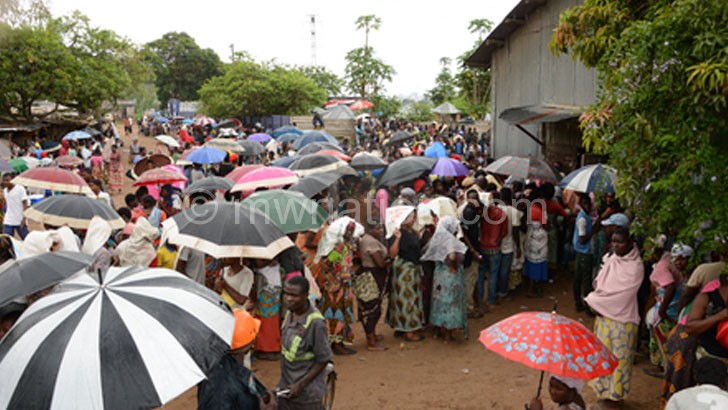When right to food is politicised
People in Loti Chisambi Village in the area of Traditional Authority (T/A) M’mbelwa in Mzimba are seething with anger and frustration.
Group village head (GVH) Loti Chisambi asks: “How can leaders that literally begged for our votes be so naïve as to subject our right to food to debate while we are starving?”
The chief, tucking a manually-made cigarette between two fingers of his left hand, says in the run-up to the May 20 2014 Tripartite Elections, aspiring members of Parliament (MPs) used to assure prospective voters that hunger would be history if they were voted into office.

Of course, the GVH does not forget that Malawi suffered adverse climatic conditions, including floods in the Lower Shire Valley, drought and dry spells in some districts and washing away of crops in others.
This resulted in reduction in harvest and consequently leading to severe food shortages.
The chief says this is natural and no one can have control over it.
“However, it is the manner in which both the opposition and the ruling Democratic Progressive Party [DPP] henchmen are handling the food shortage that resulted from this catastrophe. From their deliberations, one can easily see politicians who are working very hard to outwit each other on who should take the blame for the current food shortage instead of providing solution to the problem,” notes the GVH.
Sub traditional authority (ST/A) Kapopo Mhlanga says it becomes even more disheartening when poor villagers hear Cabinet ministers giving contradicting accounts on maize availability in the country.

Apparently, Mhlanga, also from Mzimba, is referring to Minister of Agriculture, Irrigation and Water Development Allan Chiyembekeza and Minister of Information, Tourism and Civic Education Jappie Mhango, who in February contradicted their Finance, Economic Planning and Development counterpart Goodall Gondwe on the stock levels in Admarc depots.
Chiyembekeza and Mhango told the media early February 2016 that state produce trader Agricultural Development and Marketing Corporation (Admarc) is stocking enough maize to feed hungry Malawians till the end of April 2016.
But when reporters asked him on why hundreds of Malawians were being subjected to unplanned vigils at Admarc markets as they wait to access the rationed maize, Chiyembekeza said majority of transporters are refusing to deliver maize to markets that are in rural and hard-to-reach areas.
“But government thinks this problem will soon be history because we intend to engage transporters that were contracted in the distribution of subsidised inputs. They’re currently finalising their Fisp [Farm Input Subsidy Programme] assignments; and, we now want them to help in the distribution of maize,” he narrated.
Mhango, on the other hand, said the food crisis has been blown out of proportion by some media houses, which he described as irresponsible and sensational in their reporting.
But as Mhlanga notes, this was in sharp contrast to what Gondwe had told the nation through the tax payer-funded Malawi Broadcasting Corporation (MBC) a week earlier.
He narrates: “The Finance minister said the [maize] stock in all the Admarc depots and selling points were enough for just February.
“The Finance minister further indicated that government would need K3.5 billion to buy more maize to restock Admarc depots nationwide.”
As if to exonerate himself, Chiyembekeza confessed a few days later that he indeed misinformed the nation on the availability of the staple grain in the country.
National Initiative for Civic Education (Nice) Trust executive director Ollen Mwalubunju partly blames the prevailing food crisis on failure by local politicians to give way to professionals.
Mwalubunju notes that this is the reason because Malawian politicians in the ruling camp have always tended to claim and be praised for everything that goes well even when they did not have any direct or indirect input into the success achieved.
“Conversely, politicians from the opposition will blame their counterparts in government for everything that doesn’t go well, again even when the ruling elite have not had anything to do with the failure,” he explains.
He further says that people with special expertise or skills that can be tapped in ensuring food security are not being given space as politicians fear they could be threats to their positions.
Mwalubunju adds that it is for this reason that some of the country’s “finest brains” left the country to seek employment elsewhere where they are developing other countries’ economies at the expense of theirs back home.
“It’s sad that Malawian politicians want to call the shots all the time. They want to take charge of everything, even bossing around professionals in fields they have zero knowhow.
“Surely, we must, by now have trained enough Malawians in various fields capable of coming up with solutions to our many national problems, particularly food insecurity,” mourns Mwalubunju.





